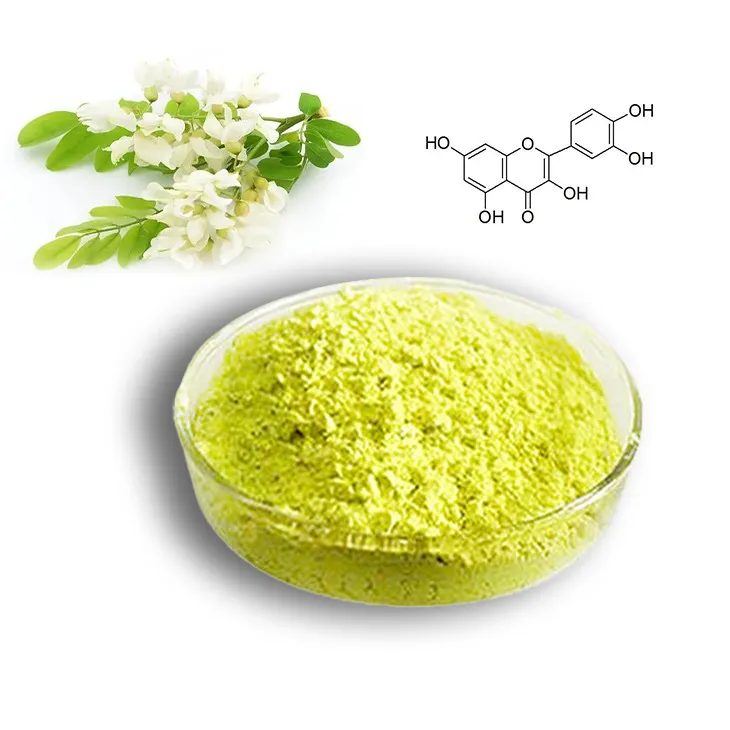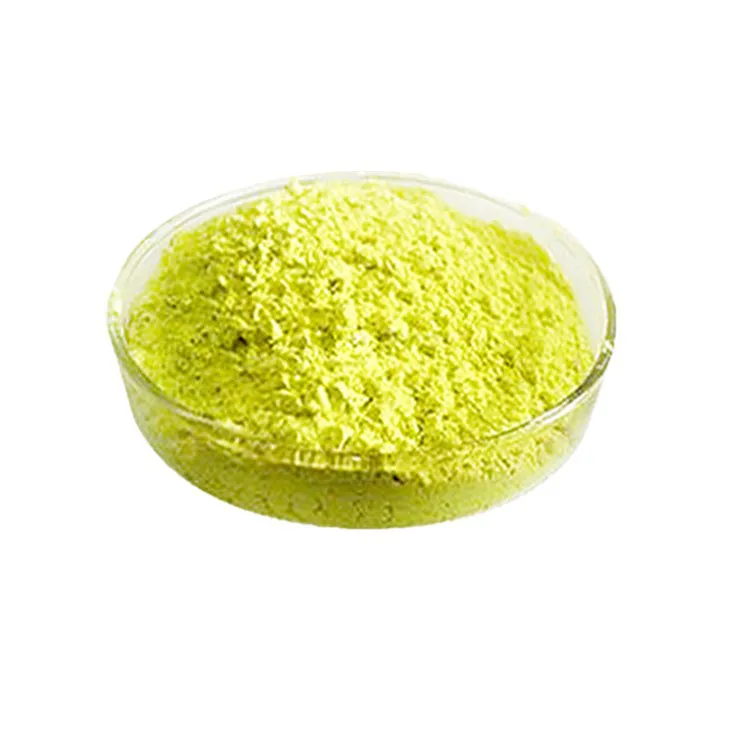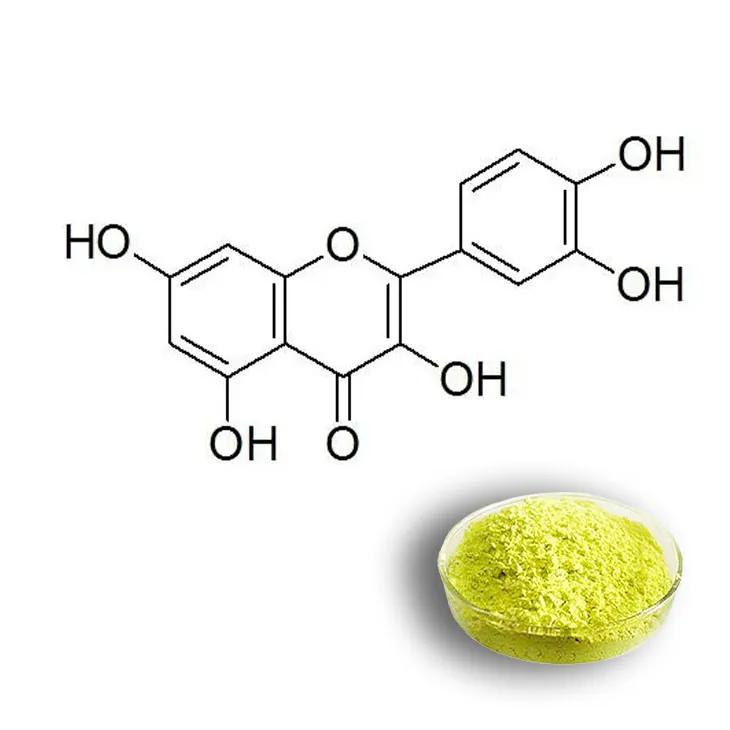- 0086-571-85302990
- sales@greenskybio.com
All the Benefits of Quercetin.
2024-11-12

Introduction
Quercetin is a flavonoid that is naturally found in many fruits, vegetables, and grains. It has been the subject of extensive research in recent years due to its numerous potential health benefits. This article will explore in detail all the benefits that Quercetin has to offer.

Antioxidant Activity
Antioxidants play a crucial role in maintaining overall health, and Quercetin is no exception. It exhibits strong antioxidant activity, which helps to protect the body's cells from damage caused by free radicals. Free radicals are unstable molecules that can cause oxidative stress in the body, leading to a variety of health problems such as heart disease, cancer, and neurodegenerative diseases.
Quercetin works by scavenging free radicals and preventing them from causing damage to cells. It also has the ability to chelate metal ions, which can further reduce oxidative stress. This antioxidant activity makes quercetin an important compound for maintaining good health.

Immune System Modulation
Another important benefit of quercetin is its ability to modulate the body's immune response. The immune system is a complex network of cells and molecules that work together to protect the body from foreign invaders such as bacteria, viruses, and parasites.
Quercetin has been shown to have immunomodulatory effects in several ways. For example, it can enhance the activity of immune cells such as macrophages and natural killer cells, which are important for fighting off infections. It can also regulate the production of cytokines, which are signaling molecules that play a key role in the immune response.
In addition, quercetin has anti - inflammatory properties, which can help to reduce inflammation in the body. Chronic inflammation is associated with many diseases, including autoimmune diseases, heart disease, and cancer. By reducing inflammation, quercetin may help to prevent or treat these diseases.

Respiratory Health
Quercetin has also been associated with improved respiratory health. It has been shown to have potential benefits for people with asthma and other respiratory disorders.
One of the ways that quercetin may benefit respiratory health is by reducing inflammation in the airways. Asthma is a chronic inflammatory disease of the airways, and reducing inflammation can help to alleviate symptoms such as wheezing, coughing, and shortness of breath.
Quercetin may also have antiviral properties, which could be beneficial for respiratory infections. Some studies have suggested that quercetin may be effective against influenza viruses, for example.

Cardiovascular Health
Cardiovascular health is of utmost importance, and quercetin may play a role in maintaining a healthy heart and blood vessels.
Quercetin has been shown to have several effects on the cardiovascular system. For example, it can help to lower blood pressure by relaxing blood vessels. High blood pressure is a major risk factor for heart disease and stroke, so reducing blood pressure can have significant health benefits.
Quercetin can also help to reduce cholesterol levels. High cholesterol is another risk factor for heart disease, and quercetin may be able to lower LDL (bad) cholesterol while increasing HDL (good) cholesterol.
In addition, quercetin has anti - platelet activity, which means it can prevent blood platelets from sticking together and forming clots. Blood clots can block blood vessels and lead to heart attacks and strokes.
Anti - Cancer Properties
There is growing evidence to suggest that quercetin may have anti - cancer properties. While more research is needed, the current findings are promising.
Quercetin has been shown to have several mechanisms of action that may be relevant to cancer prevention and treatment. For example, it can induce apoptosis (programmed cell death) in cancer cells, which can help to eliminate cancer cells from the body.
Quercetin can also inhibit the growth and proliferation of cancer cells by interfering with various signaling pathways that are important for cancer cell survival. It may also have anti - angiogenic properties, which means it can prevent the formation of new blood vessels that are necessary for cancer cells to grow and spread.
Neuroprotective Effects
Quercetin may also have neuroprotective effects, which could be beneficial for preventing or treating neurodegenerative diseases such as Alzheimer's and Parkinson's disease.
One of the ways that quercetin may protect the brain is by reducing oxidative stress. The brain is particularly vulnerable to oxidative stress due to its high oxygen consumption and lipid content. By reducing oxidative stress, quercetin may help to prevent damage to brain cells.
Quercetin may also have anti - inflammatory properties in the brain, which can help to reduce inflammation - related damage. In addition, it may be able to modulate neurotransmitter levels, which could have implications for cognitive function.
Diabetes Management
For people with diabetes, quercetin may offer some benefits in terms of managing the disease.
Quercetin has been shown to have effects on blood sugar levels. It can help to lower blood sugar by improving insulin sensitivity. Insulin is a hormone that is responsible for regulating blood sugar levels, and improving insulin sensitivity can help the body to better manage blood sugar.
Quercetin may also have anti - inflammatory properties in the context of diabetes. Chronic inflammation is associated with diabetes complications such as neuropathy, retinopathy, and nephropathy. By reducing inflammation, quercetin may help to prevent or delay these complications.
Conclusion
In conclusion, quercetin is a flavonoid with a wide range of potential health benefits. It exhibits strong antioxidant activity, can modulate the immune system, and has been associated with improved respiratory, cardiovascular, anti - cancer, neuroprotective, and diabetes - related benefits. While more research is needed to fully understand the mechanisms of action and potential applications of quercetin, the current evidence suggests that it is a promising compound for promoting health and preventing disease.
FAQ:
What is the main antioxidant mechanism of quercetin?
Quercetin exerts its antioxidant activity mainly through scavenging free radicals. It can donate electrons to free radicals, thus neutralizing their reactivity and preventing them from causing oxidative damage to cells and tissues.
How does quercetin modulate the immune response?
Quercetin can modulate the immune response in multiple ways. It may influence the function of immune cells such as macrophages, lymphocytes, and dendritic cells. For example, it can enhance the phagocytic activity of macrophages and regulate the cytokine production of lymphocytes, which helps to make the immune system more balanced and effective.
Can quercetin completely cure asthma?
No, while quercetin has been associated with improved respiratory health and may alleviate some symptoms of asthma, it cannot completely cure asthma. Asthma is a complex chronic disease, and current treatments usually involve a combination of medications and lifestyle management. Quercetin may be used as a complementary approach to support respiratory health.
Are there any side effects of quercetin?
In general, when consumed in normal amounts from dietary sources, quercetin is considered safe for most people. However, in high - dose supplement form, it may cause some side effects such as stomach upset, headache, or allergic reactions in some individuals. It is always advisable to consult a healthcare provider before starting any new supplement.
How can one obtain quercetin?
Quercetin can be obtained from various dietary sources. Fruits such as apples, berries (e.g., blueberries, strawberries), and citrus fruits contain quercetin. Vegetables like onions, kale, and broccoli are also good sources. Additionally, some supplements are available in the market for those who may need a higher intake.
Related literature
- Quercetin: A Promising Molecule for Health Benefits"
- "The Role of Quercetin in Antioxidant Defense and Immune Modulation"
- "Quercetin and Respiratory Health: Current Evidence and Future Perspectives"
- ▶ Hesperidin
- ▶ Citrus Bioflavonoids
- ▶ Plant Extract
- ▶ lycopene
- ▶ Diosmin
- ▶ Grape seed extract
- ▶ Sea buckthorn Juice Powder
- ▶ Fruit Juice Powder
- ▶ Hops Extract
- ▶ Artichoke Extract
- ▶ Mushroom extract
- ▶ Astaxanthin
- ▶ Green Tea Extract
- ▶ Curcumin
- ▶ Horse Chestnut Extract
- ▶ Other Product
- ▶ Boswellia Serrata Extract
- ▶ Resveratrol
- ▶ Marigold Extract
- ▶ Grape Leaf Extract
- ▶ New Product
- ▶ Aminolevulinic acid
- ▶ Cranberry Extract
- ▶ Red Yeast Rice
- ▶ Red Wine Extract
-
Bitter Melon Extract
2024-11-12
-
Nettle Root Extract
2024-11-12
-
Cassia Seed Extract
2024-11-12
-
Licorice Root Extract Powder
2024-11-12
-
Golden Seal Extract
2024-11-12
-
Soy Extract
2024-11-12
-
melatonin extract
2024-11-12
-
Kelp Extract Powder
2024-11-12
-
Citrus bioflavonoids
2024-11-12
-
Horse Chestnut Extract
2024-11-12





















